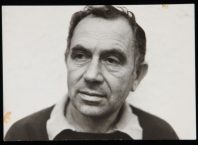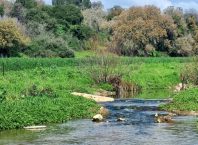Michal Dekel was sitting in a pub in Tel Aviv, when a friend told her, “There’s a contest you just have to enter!” That was in the spring of 2007, and not long afterwards, Michal became the first Israeli winner of Fame Lab. A hybrid of Pop Idol style competitions and scientific research, Fame Lab is the brainchild of the UK Cheltenham Science Festival and NESTA, which began in the UK in 2005. Introduced in Israel by the British Council in 2007, the 2010 Israeli competition is organized by the Hemda Centre for Science Education in Tel Aviv and sponsored by Teva and the British Council . Looking forward to auditions for the 2010 competition coming up in mid-April, Midnight East met with past winners Michal Dekel, Adi Yaniv and Shani Waidergoren to talk about the Fame Lab experience and its impact on their lives.
Before Fame Lab, they were just ordinary beautiful young scientists working on their research who almost inadvertently found themselves involved in the competition. After Fame Lab, all three are unanimous in saying that it was a life-altering experience. While all three are still young, beautiful scientists, who are a bit farther along in their research, the real transformation has been in their enthusiastic commitment to sharing their knowledge with others.
Shani Waidergoren, the most recent winner, had studied at Hemda in high school and knew of the competition’s existence for two years before deciding to enter. She was in the third year of a joint Masters/Ph.D. program in Neuroscience when she thought, “it would be cool and fun – why not?” There are two stages to the auditions, which take place in Haifa, Tel Aviv and Jerusalem. Contestants give a three minute talk on a research topic (without the use of posters or power point presentations!) before a panel of judges. Those who succeed in the first round must then present a second topic in the evening. However, this part of the competition is open to the public, so the finalists try their presentation skills before a wider audience. Three finalists are then selected to compete in the finals, which will take place this year at Hemda on May 5.
For her first two talks, Shani selected topics in the field of brain research: mirror neurons – a network that reflects the behavior of other people in order to understand them, and blind sight (a second, separate and more primitive system in the brain that is receptive to movement, which is expressed in some people who are blind, yet respond to objects around them as if they can see). She prepared herself well, saying, “I wanted to be able to answer any questions that the judges might ask. I read and prepared notes then I presented the talk – to myself, and my family. They gave me a lot of feedback – negative feedback. My family really improved my talk.”
Shani’s third topic, prospagnosia – a disorder in face recognition, made her the 2009 winner:
Shani says winning the competition “Changed my world 180 degrees. I discovered a talent I didn’t realize I possessed. In terms of science communication – it was something I knew existed, but I never thought of myself as someone who could create it.”
An important aspect of the Fame Lab experience is the training they receive after passing the first round. The nine finalists participate in a master class in science communication, which will be presented this year, as in the past, by Malcolm Love. “He is simply wonderful!” says Adi Yaniv, Fame Lab 2008 winner, “he is an amazing human being – and he looks like Richard Gere. He is not a scientist but has a lot of experience teaching others how to present science.”
Adi, who has recently completed a Masters degree in Law, specializing in intellectual property, and is in the final stages of completing a Masters degree in Bio-Medical Sciences, sent in the application to Fame Lab without giving the matter much thought. When the letter arrived with details of the competition and audition dates, she didn’t know what she would talk about. She arrived at the initial round “without any expectations” and spoke about communication between bacteria – a topic from a course she had been taking at the time. She found it fascinating to listen to the different topics presented. Her second topic (rather hastily prepared she confessed) was “Tyrannosaurus Rex – predator of live prey or consumer of carrion?”
All three describe the meeting with fellow scientists as one of the best parts of the experience. Adi describes her fellow competitors as “A concentration of talented and interesting people. In the beginning it was a little stressful, but the atmosphere is unusually supportive. We all lefargen (from Yiddish: to support and enjoy another’s success without jealousy) – there was no competitiveness among us. It was the same in the international competition.”
Once she was selected as a finalist, “it had become serious. I spent about three days preparing for the final talk.” Her topic was – Vasopressin, a hormone which plays an important role in the loyalty of male to female voles. Says Adi, “I chose a topic that interested me and considering that 50% of the population is women – would interest my audience as well.”
What does it take to become a winner? According to Adi, “You need to be a bit of an actor, to create a story, to be entertaining.” However, she also points out, “You need to do that at conferences as well, otherwise people fall asleep on you. It is thought that whoever does popular science is not a serious scientist, but there are lecturers who don’t know how to explain anything to anyone. If you can’t explain something simply, it implies that you do not understand it well enough. Until I tried to explain things meaningfully to others, I wasn’t aware of the gaps in my own understanding.”
Competition winners represent Israel at the Cheltenham Science Festival in England, an unforgettable experience for all three winners. Michal Dekel attended the science festival in 2007, at a time when an academic boycott of Israel was being hotly discussed in the UK. Michal says that not only was she warmly received by everyone she encountered at the festival, “I had the opportunity to tell people about science in Israel and why I believe in scientific cooperation.”
Michal, who is currently working on her Ph.D. researching stability of genomes in embryos and stem cells, was “always interested in human genetics.” Her first talk was on PGD (pre-implantation diagnosis of embryos fertilized in-vitro), and for her second topic she discussed cloning. The topic of her final presentation “Mickey Mouse – Minnie Doesn’t Need You Anymore” refers to a mouse born as a result of embryos created from the fertilization of two eggs – without the intervention of sperm.
Although some scientists fear that the attempt to convey contemporary research to the general public results in distortions, Michal says, “You don’t relinquish any of the science. [You describe the process and say] look at what can be done, what are the ethical implications of this? You want to connect the topic to their daily lives to show people how it can affect them. You want to awaken something so that they will go home and think about it, maybe look it up on the internet.”
She adds, “I have a friend who is an artist sometimes I talk about ideas from research and it gives her ideas. We each have different backgrounds, the inspiration goes both ways.”
The Fame Lab experience extends far beyond the individual, creating friendships and working relationships between young scientists in Israel and in other countries. As Michal said, “first came friendship.” These friendships created through Fame Lab have led to collaborations in the area of science communication with scientists from Greece, Croatia and England. This year the competitions have expanded to other countries, and the circle of friendship and intellectual collaboration will grow.
Inspired by their experience, several of the participants in the first Israeli Fame Lab in 2007 created a group of enthusiastic and talented science communicators called “Science for Everyone,” organized by Roey Tzezana. Michal, Adi and Shani, as well as many other former “Fame Labbers” take time out of their busy schedules to talk science to groups and schools throughout the country.
Do you have what it takes to translate scientific research into a fun, 3 minute talk? Why not try your skills at Fame Lab Israel 2010. Auditions will take place on April 13 at the Technion in Haifa, April 14 at Hemda in Tel Aviv and April 21 at the Bloomfield Science Museum in Jerusalem. Additional information and online registration is available on the Hemda website.
AYELET DEKEL





